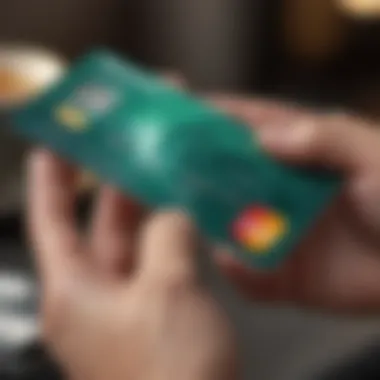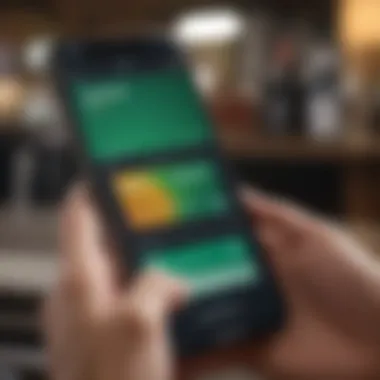Linking a Debit Card to Cash App: Your Complete Guide


Intro
Linking a debit card to Cash App satisfies numerous wants in the realm of modern finance. It empowers users to conduct transactions easily, pose real-time functionalities, and presents an approachable yet robust financial tool. As the digital payment landscape evolves, understanding how to effectively integrate one's debit card can lead to both convenience and optimization of finances.
Overview of the Topic
Definition and Importance of the Topic
Cash App is a financial platform that provides a user-friendly interface for money transfers and payments. Linking a debit card to this application is a significant step, allowing users to easily send money or make payments via mobile devices. This process not only simplifies monetary transactions but also opens the door to additional features like Cash Card usage, investment functionalities, and even direct deposits.
Key Benefits and Implications
There are multiple benefits to linking a debit card to Cash App:
- Instant Transactions: Linking facilitates quick transfer of funds. Money is usually available for use immediately.
- Enhanced Security: Added security measures are put in place, providing greater protection over cash transactions.
- Accessibility: Enables users to manage their funds more conveniently in one application rather than juggling concrete card usage.
However, neglecting this process can limit one's ability to capitalize on these features, emphasizing the importance of understanding how to navigate the linking process effectively.
Exploring Strategies and Tips
Practical Tips for Implementation
To efficiently link a debit card to Cash App, consider the following steps:
- Download the App: If not already downloaded, get the cash app on a smart device.
- Sign Up or Log In: Create an account or log into your existing account.
- Go to the Banking Section: Click on the banking icon located on the home screen.
- Add Debit Card: Select the option to add a debit card and input the required information, including card number, expiry date, and CVV.
- Verify the Card: Complete verification process for added security.
Implementing these tips make the linking process straightforward.
Strategies for Effective Management
After successful linkage, managing your debit card usage effectively can be advantageous. Some approaches to enable efficient use include:
- Budgeting: Allocate funds for various expenditures; keeping an eye on spending categories aids in smart financial discipline.
- Set Up Notifications: Custom alerts can remind users of distinct spending habits or unusual charges, thus enhancing security awareness.
Expert Insights and Recommendations
Pulling insights from various financial experts suggests users should always check for fees or limitations associated with their bank and Cash App interaction.Additionally, global security policies should be thoroughly understood to ensure data protection for linked cards.
Using Cash App effectively means navigating it with an understanding of potential services offered and how best one's debit card can realistically improve overall financial wellness.
By employing the strategies discussed above and remaining vigilant regarding security measures, users can potentially mitigate risks while maximizing their experience on Cash App.
“A careful approach to linking financial accounts leads to better excited experience in digital platforms.” - Financial Advisor
Intro to Cash App
Linking a debit card to Cash App is a practical choice for many users. Understanding Cash App's comprehensive features highlights its convenience in digital transactions. With a rapidly changing financial landscape, familiarizing oneself with this app can enhance your ability to manage money more effectively.
Overview of Cash App Features
Cash App is a mobile payment service that enables users to transfer money to others and make purchases. Some notable features include:
- Money Transfers: Cash App allows for quick sending and receiving of funds between users.
- Cash Card: Users can order a prepaid debit card linked to their Cash App balance, making it easier to spend money seamlessly.
- Bitcoin Support: Users can buy, sell, and transfer Bitcoin through the app. This feature expands the investment options for users interested in cryptocurrency.
- Investing: Users can buy stocks using Cash App, tailored for those who want to pioneer their investment journey without complicated setups.
These features collectively define a user-friendly platform ideal for individual financial management.
The Role of Debit Cards in Cash App
Debit cards serve a significant function within the Cash App framework, facilitating faster transactions and an additional layer of financial flexibility. Linking a debit card broadens the app’s functionalities. Here are some aspects:


- Direct Access to Funds: Linkage allows for immediate utilization of funds from one’s bank account.
- Enhanced Transactions: Activating payments becomes more accessible by simply swiping the card at various vendors and services supporting Cash App payments.
- Cost-effective Spending: Debit cards linked to Cash App help users track their spending against their bank balance, avoiding overspending and associated bank fees.
As financial apps become more prevalent, recognizing how debit cards complement services like Cash App remains increasingly imperative.
Benefits of Linking a Debit Card
Linking a debit card to Cash App brings forth several advantages that enhance the overall user experience. Whether for the speedy transactions or added layers of security, understanding these benefits is crucial. Each advantage plays a critical role in making digital payments both convenient and secure.
Instant Transfers and Payments
One significant benefit of linking a debit card to Cash App is the ability to make instant transfers and payments. When using a debit card, funds are usually available instantly compared to other methods, such as bank transfers, which might take a few days. Immediate accessibility to funds facilitates seamless transactions for both personal and business use.
Moreover, this near-instant access could be vital in emergency situations. For example, if you need to pay a friend back or make a quick purchase without having cash on hand, having a linked debit card enables agility in your transactions. You avoid the delays that could occur with manual bank transfers. Such functionality enhances overall user satisfaction. It operates efficiently, thus fulfilling the user expectation of rapid financial movements in today's fast-paced digital world.
Increased Withdrawal Options
Another indispensable benefit is the increase in withdrawal options. A linked debit card often allows users to withdraw cash from ATMs that accept debit cards. Traditional banking methods may limit cash withdrawals through less-than-convenient channels.
Having a card linked to Cash App bolsters flexibility, making it possible to withdraw at numerous accessible locations without dependency on your physical bank's ATM availability. This can be particularly beneficial for those who travel frequently or reside in areas away from their preferred banking institution. Improved withdrawal options reduce inconvenience and empower the users by providing them more control over their financial activities.
Enhancements on Mobile Payment Convenience
Users will find it easier to transfer cash without physically visiting a bank or an ATM. It’s a solution to financial mobility issues that traditionally plagued many users looking to manage funds efficiently.
Enhanced Security Features
Lastly, enhanced security features represent a notable advantage of linking a debit card to Cash App. Many users have apprehensions regarding the safety of their online transactions. However, Cash App implements various security standards to combat potential threats—such as data encryption and fraud monitoring.
When linking a debit card, users can take further consider just having safety mechanisms like two-factor authentication linked firmly into the app, augmenting a user's peace of mind while making transactions. Financial information stays protected. If a transaction does go awry, reports of fraudulent activity can escalate protection features issued by your bank without undue liability on your part.
Secure transactions are the core of maintaining trust in digital payment systems.
Requirements for Linking a Debit Card
Linking a debit card to Cash App is an essential process when elevating the financial functionality of the application. Understanding the requirements can streamline this addition, facilitating a more efficient experience. Various aspects influence how this integration can be approached, including types of cards, and the personal data you must provide. Knowing these specifics helps in avoiding issues down the line and enhances your overall engagement with the app.
Compatible Debit Cards
Not all debit cards can be linked to Cash App. This limitation hinges on certain financial institutions and the functionalities they support. Generally, Cash App works best with debit cards that are part of a major payment network. For instance, cards operated under Visa or Mastercard standards will usually function seamlessly with the application.
Keeping in mind the following factors can help ensure you choose the right card:
- Check Network Compatibility: Confirm that your debit card is part of the Visa or Mastercard network. This ensures optimal performance without unforeseen interruptions.
- Examine Account Status: Cards should be in good standing. An inactive or closed account will result in failure to link.
- Review Terms and Conditions: There may be limits on withdrawals and payments that could affect usability.
By selecting a compatible debit card, users can unlock features like instant money transfers and increased functionality within Cash App.
Necessary Personal Information
Providing the necessary personal information during the linking process is a critical step. You have to supply your name, billing address, and possibly other identifiers associated with the debit card. These details are crucial for verification and security.
becoming familiar with some key information can make the linking experience smoother:
- Full Name and Address: Your name must be exactly as it appears on the debit card, and your address needs to match the one registered with the bank.
- Social Security Number: Linking may require the last four digits of your Social Security Number. This is typically needed for identification purposes to protect your account from fraud.
- Authentication Codes: Some banks may send codes to your phone or email for additional verification. It’s advisable to have these ready when linking your card.
In summary, understanding what types of debit cards are compatible and what personal data is necessary ultimately plays a vital role in the successful integration with Cash App. This groundwork lays a strong foundation for tackling subsequent steps involved in utilization.
Step-by-Step Process to Link a Debit Card
Linking a debit card to Cash App is a critical step for users looking to enhance their financial experience within the platform. This process not only streamlines money transfers and transactions but also powers the user’s ability to access funds more efficiently. Understanding this process is essential for maximizing the potential of Cash App and enjoying its integrated features. By grasping the specific actions required, users can navigate the app with confidence while ensuring that their financial data remains secure.


Accessing Cash App Settings
The path to linking a debit card begins by accessing the Cash App settings. This part is fundamental as it sets the stage for the linkage process. Once the app is opened, users will typically find a profile icon in the top-right corner of the screen. Tapping on this icon grants access to various settings options available. From here, navigate to the
Common Issues When Linking a Debit Card
Linking a debit card to Cash App is mostly straightforward. However, some common obstacles can hinder the process. Addressing these issues can significantly enhance your experience with the app, ensuring smoother transactions and fewer frustrations. In this section, we will explore several common challenges, their implications, and ways to mitigate these problems.
Incorrect Card Information
Providing the correct card information is crucial. If the information entered during the linking process is not accurate, it can lead to immediate failures in linking the card. Common mistakes may include:
- Typos in the card number: A single incorrect digit can disrupt the entire link.
- Wrong expiration date: Ensure that you are entering the correct month and year.
- Inaccurate CVV code: This three-digit number is essential for verifying the card and must match exactly.
Check and recheck the entered details. This step is important for avoiding unnecessary issues. If the card details do not match the bank's records, the card may not link properly. If problems persist, contacting customer service or your bank could prove helpful.
Bank Restrictions and Failures
Various banks implement specific restrictions that can affect linking your debit card to Cash App. These restrictions often arise due to security measures or specific policies. Common reasons for bank-related issues include:
- Limitations on non-app payments: Some banks do not allow linking to third-party payment platforms.
- Need for authentication: Certain banks may require additional validation before allowing linking.
- Declining transactions: If recent activity flags within your bank account, it can signal a total mobile payment restriction temporarily.
Make sure to speak to your bank if you suspect there are underlying issues. Understanding their policies can prevent unexpected roadblocks in the linking process.
App Glitches and Errors
Occasionally, technical problems within Cash App can prevent your debit card from linking successfully. These glitches may arise from:
- App updates: Ensuring that you have the latest version can eliminate many issues.
- Connectivity troubles: Poor internet connections can lead to lagging responses or incomplete processes.
- Error messages: Knowing how to interpret app error codes can help in troubleshooting.
To smooth out these technical hurdles, regularly update the app and check your internet connection. It can also be worth reinstalling the app if problems consistently arise. Having a basic understanding of the app's required conditions eases your capacity to navigate through potential failures.
Only accurate entries and determined troubleshooting can ensure seamless integration of a debit card with Cash App.
Security Considerations
Security should be a primary concern for anyone linking a debit card to Cash App. This financial application processes sensitive banking information, making it essential to adopt measures that protect personal data effectively. Users need to understand risks and take steps to mitigate them when engaging with the platform type.
Besides ensuring ease of use, strong security protects against fraud and unauthorized access. Here's what you need to know about securing your account effectively.
Protecting Personal Information
When linking your debit card to Cash App, protecting personal information is crucial. Avoid sharing details such as your Social Security number or account numbers publicly. Data leaks or questioned informations can be harmful and not just from malicious individuals, but also from civil oversight. Here are basic tips to keep your information secure:
- Keep sensitive information private. Do not share your Cash App login details.
- Regularly update your passwords to ensure your account remains secure.
- Use unique passwords. Avoid reusing passwords across different platforms.
Another important aspect is keeping your mobile device safe. Ensure your phone has the latest security updates. Additionally, remote wiping apps can prevent third parties from accessing your information if your device is lost.
Protecting your personal information is not only about general precaution. Specific attention to managing your data helps minimize risks such as identity theft and financial fraud.
Enabling Two-Factor Authentication
Two-factor authentication (2FA) offers an added layer of security for your Cash App account. When activated, this feature requires not only your password but also an additional piece of information to verify your identity. Here’s how 2FA enhances security:
- It can protect your account even if your password is compromised. The extra verification step acts as a safety net.
- Many systems send authentication codes through text, email, or authenticator apps. This makes it harder for a fraudster who may only have your password.
To enable two-factor authentication in Cash App:
- Navigate to profile settings.
- Select security settings.
- Follow instructions to enable 2FA.


Having 2FA in place is a recommended practice for all transactions done online. With online threats growing consistentyl, the extra step can be vital for maintaining secure financial activity on Cash App. In a time where financial dependence on apps is substantial, executing basic yet thorough procedures elevates your user experience and ensures data protection.
Alternative Linking Methods
Linking a debit card is not the only way to connect to Cash App. Understanding the alternative linking methods is key for users who may want flexibility in their payment approach. Each option comes with its own set of benefits and limitations, which can greatly impact how individuals manage their finances through the app.
Using a Bank Account Instead
Linking a bank account to Cash App offers various advantages over simply using a debit card. Connecting directly allows for larger withdrawal amounts and seamless fund transfers. Users can link their checking or savings accounts, providing a more comprehensive banking solution through Cash App.
This method is especially feasible for individuals who prefer keeping their debit card separate from the app. By linking their bank account, users can:
- Transfer larger sums: Withdrawals from a linked bank account typically have higher limits compared to debit cards.
- Avoid card fees: Some banks offer services with minimun or no fees, potentially reducing transfer costs.
- Maintain financial records: Transactions reflecting directly from accounts may aid in managing budgets more systematically.
Whenever using a bank for linking, it is vital to protect personal information. Entering bank details accurately can mitigate issues down the road.
Linking Credit Cards with Cash App
Aside from debit cards, Cash App allows users to link credit cards as well. This feature serves as a useful alternative in specific scenarios, particularly for users wishing to accumulate reward points or manage cash flow for short-term payments.
Linking a credit card may prove beneficial due to the potential to:
- Earn rewards or cash back: Many credit cards have reward programs that can benefit people participating in more transactions.
- Utilize cash management strategies: Credit users might link their cards for expenses temporarily while managing returns from different investments or pay points.
- Increase purchase flexibility: Credit cards typically offer more robust fraud-reduction policies, along with protection to users when online purchasing is needed.
It is important to note, however, that credit-utilization could potentially incur additional fees if not managed carefully. Users should consider their budget as improper use may lead to accumulating debt unintentionally.
Overall, both alternative methods of linking provide diverse ways to interact with Cash App, thereby allowing users to choose what aligns best with their financial behavior and preferences. The ultimate goal is to blend convenience with responsible budgeting.
User Experience and Feedback
Understanding user experience is crucial when discussing the integration of a debit card with Cash App. The overall performance and user satisfaction contribute significantly to how well people perceive the application’s functions. Users expect a seamless, intuitive interface that provides them immediate access to their finances without hassle. The elements of user experience for Cash App encompass its speed, reliability, and ease of navigation.
An empathic approach to feedback allows developers and designers of Cash App to continually refine and enhance functionalities. When users feel heard and valued, it leads to greater satisfaction levels, fostering brand loyalty. Incorporating constructive feedback into the application helps to meet user expectations efficiently.
Satisfaction Levels Among Users
The satisfaction levels among Cash App users largely depend on the reliability and ease of use involved when linking a debit card. Most users appreciate the speed at which transactions are processed. They have noted that using Debit Cards for direct deposits helps in making transactions smoother and transactions appear instantaneously within the app, which is truly favorable. An additional positive aspect perceived among users is the intuitive user interface, which has been regarded as easy to follow even for those who may not be tech-savvy.
Research has shown that a large percentage of users report a high level of satisfaction when they link their debit cards successfully. Engaging directly with feedback channels allows potential issues to surface early, offering opportunities for ongoing improvement and broader effectiveness.
Common Complaints and Suggestions
Despite a generally favorable experience, users often share complaints regarding linking errors that occur during the debit card setup. Common issues include mismatching personal information, which can prevent users from successfully connecting their cards to their Cash App account. When such roadblocks arise, it can lead to frustration and decreased satisfaction levels.
In the attempt to alleviate these common concerns, users suggest implements of clearer guidelines during the linking process. Simplifying the identification steps could optimize efficiency, minimizing errors. Additional features that could make linking easier may include in-app prompts for common issues or a tutorial section addressing frequent problems faced by users.
Adding a comprehensive FAQ or chat support directly within the app may enhance general usability and help users resolve complications efficiently. Overall, recognizing and acting upon user feedback will inform further steps to enhance the user experience with linking debit cards to Cash App.
Ending
Understanding the processes involved in linking a debit card to Cash App is essential for maximizing the app's utility. In this article, we explored the steps drawn from initiating the process to tackling potential challenges. Below, we outline important insights to ensure a smooth experience.
Recap of Key Steps and Considerations
Linking a debit card to Cash App encompasses several steps, each vital for seamless integration. Here are the summative points:
- Choosing the Right Debit Card: Make sure your card is compatible with Cash App.
- Entering Accurate Information: Carefully input your debit card details in the app settings. Ensure that each number is correct to avoid unwanted issues.
- Verifying the Card: Follow any prompted procedures that establish authenticity. This can include verification codes sent via your bank.
- Security Practices: Enable two-factor authentication to bolster security.
Moreover, keep an eye on possible restrictions from banks and provide accurate personal data. Any discrepancies could delay linking.
“User awareness and correct practices can significantly reduce transaction errors.”
Final Thoughts on Cash App Integration
As digital transactions continue to grow in importance, integrating a debit card within Cash App reflects a modern approach to personal financial management. Benefits such as instant transfers, increased security, and convenience shape today's digital interaction with money. It is not merely about convenience but establishing responsible usage patterns. All cost-free or low-cost options should be considered, impacting overall money management positively. As financial tools evolve, remaining informed is crucial for both novice and seasoned users.



